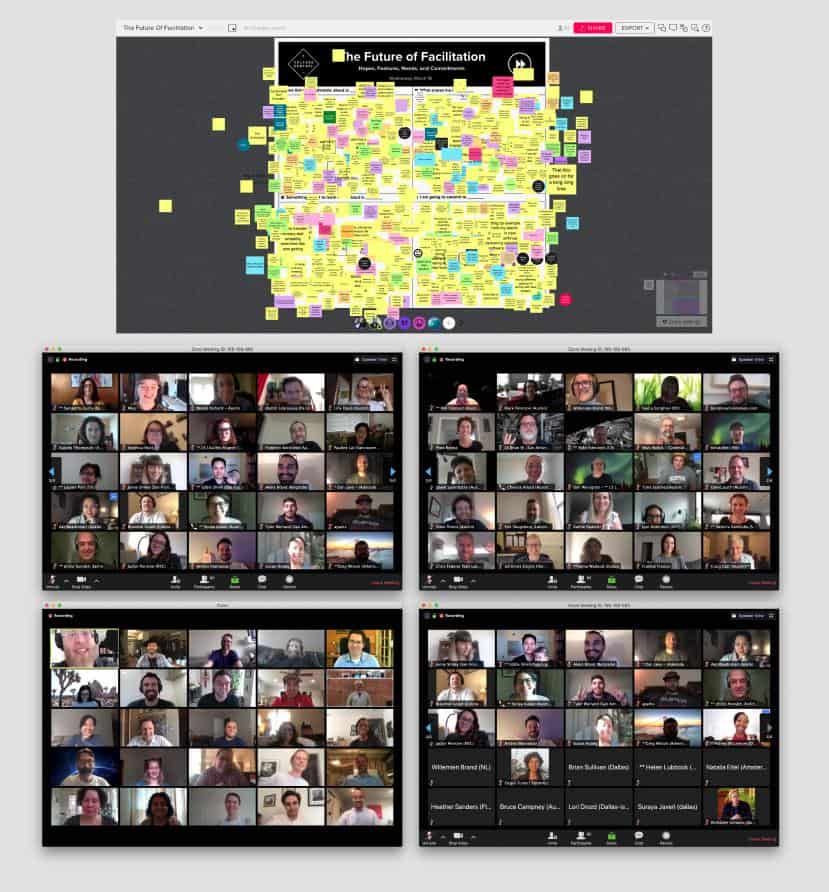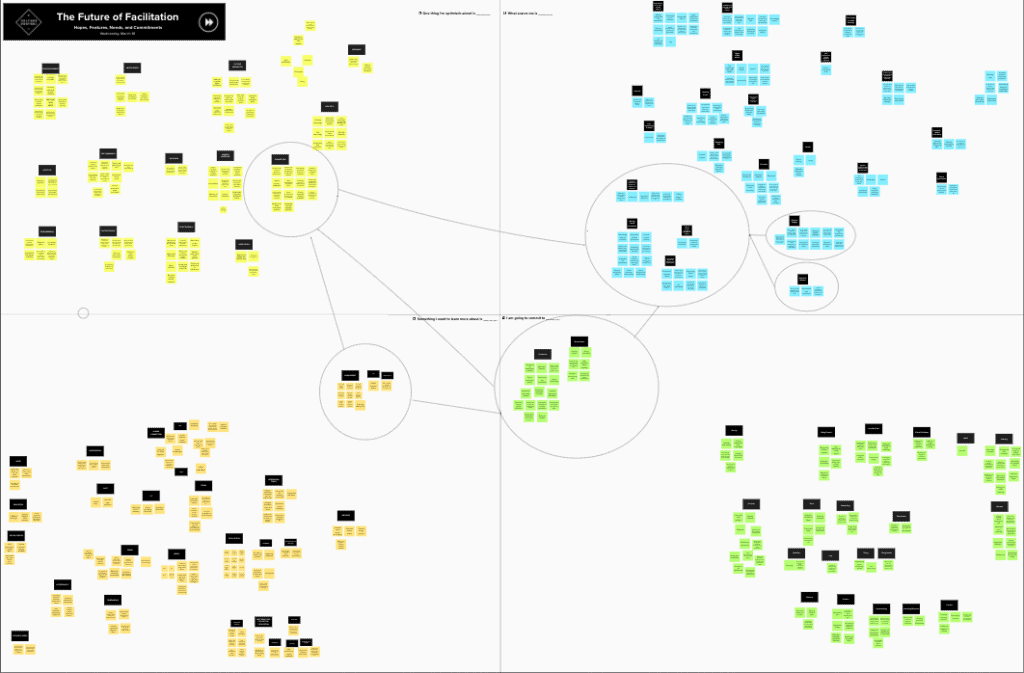Addressing the need for virtual facilitation amidst the coronavirus pandemic
The unknowns of COVID-19 pose a concern for how to continue business as usual and many facilitators have found themselves wondering how to navigate this transition. So last week, Voltage Control hosted a virtual workshop to discuss the future of facilitation. 120 participants from coast to coast, as well as Canada, Europe, Asia, and Africa, joined in a live Zoom gathering to explore what is possible and how together we can shape a new virtual space and learn from one another.
“As facilitators, we should be always be adapting to what’s happening around us and looking for ways to apply our skills to challenges beyond our workplace to help our communities during challenging times.” –Anthony Sanchez, Experience Lead at Funsize

We have curated the important findings and takeaways from the workshop in the following recap.
Introduction
Voltage Control President Douglas Ferguson was the event Leader and Events Manager Tara Weghorst was the Minder.

After a welcome and intro, Douglas encouraged all participants to turn on their video feature to foster more connection with the group. Doing so, he explained to attendees, is a better way to show empathy to each other and bring the human element to virtual meetings–a vital component for successful virtual meetings and virtual facilitation overall, so we might as well start now!
Breakout Session #1: Conversation Cafe
Participants were randomly assigned to breakout room chats in groups of four to discuss the question, “What’s the Future of Facilitation?” in a Conversation Cafe.

Participants voiced their concerns and ideas about the future with one another in each breakout room, from how to foster human connection virtually, to questions of how to effectively transition in-person facilitation to the internet and the best tools and resources to utilize. Participants were alerted by a timer and pop-up notifications at the top of their screens when it was time to move to each round.

After completing the session’s four rounds, all participants were automatically re-routed to the main event screen for the second activity.
Stickie Time using MURAL
Douglas then introduced a massive stickie session using MURAL, a virtual workspace that helps teams collaborate. The app allows participants to create and share “stickie notes” much like a real-life brainstorm session.

All participants were asked to answer the following four prompts per each quadrant in regards to their hopes and fears of the future of facilitation. Participants were given three minutes to work per each quadrant:
- One thing I’m optimistic about is…
- What scares me is…
- Something I want to learn more about is…
- I am going to commit to…

There were many results–a true Stickie Storm! Below is an overview of the results per quadrant, as synthesized by Voltage Control President Douglas Ferguson, Voltage Control Content Manager Frankie Francis, MURAL Project Manager Megan Landes, Managing Director of MG RUSH Facilitation Training and Coaching Terrence Metz, Conversation Designer at The Conversation Factory Daniel Stillman, and Founder of SLC Human-centered Design Chris Federer.

Quadrant 1: What Facilitators are optimistic about
There was great optimism about the future of facilitation across the board. Many participants saw major opportunities in this transitional time to enhance connection with their teams and clients, acquire a new virtual skillset, teach others, and collaborate on a global scale, to name a few.
“Facilitation is more important than ever. Going online is harder, and in times of stress it’s hard to think straight…and that’s our job as facilitators. So it’s great to get together with our community and build our future together.” –Daniel Stillman, Conversation Designer at The Conversation Factory

Quadrant #2: What facilitators fear
Common fears included losing personal connection with others, the inability to properly navigate and encourage the “energy in the room” during virtual meetings and workshops, and how to mitigate distractions in a virtual space.
“Our biggest fear is also our biggest opportunity. Human connection. The paradox is around wherever we can become excellent at virtual human connection without the expense of in-person experiences.” -Douglas Ferguson

Quadrant 3: What facilitators want to learn
Overall, facilitators said they want to learn the best practices and effective tools for online meetings, workshops, and events in order to successfully facilitate.
“It’s amazing that it took a global pandemic for us to truly embrace these tools on a mass scale.” -Douglas Ferguson
This includes ways to encourage and maintain participant connection, smoothly navigate and lead discussions, and how to employ virtual practices to make the innovation industry better and effective in this unique time.

Quadrant 4: What Facilitators are committing to
This is an exciting time for the world of facilitation, and participants said they are looking forward to making commitments for future success. This includes remaining positive and present, learning and growing in the role of a facilitator, expanding their skills and capabilities to connect with and help others, and exploring the new possibilities of virtual connection and collaboration.

Breakout Session #2 & #3
After the MURAL activity, participants were again randomly sorted into breakout rooms in groups of two, followed by groups of four, to discuss their Stickie experience as well as final thoughts about the future of facilitation and how they are preparing for it.
Eva Kaniasty, a UX Consultant at Slipper Studios, was among the workshop participants and shared why she decided to log in and join the workshop:
“As a user experience consultant, I’ve done a lot of one-on-one, remote user research, but have found remote group facilitation challenging. Given the current coronavirus crisis, I believe that we are about to see a surge in demand for online facilitation of design workshops, so I am looking to prepare to meet that challenge.”
Future Virtual Workshops
Voltage Control will be hosting weekly virtual workshops of varying topics to help facilitators navigate the future of facilitation and provide an online community space for people to gather and learn from one another.
Douglas said he is excited about hosting these virtual workshops every week and continuing the conversation with the global community. He also spoke to his personal excitement about the future of facilitation for Voltage Control and the industry as a whole:
“What’s fascinating to me is how this unlocked a new possibility for me. Even though we are a distributed team and are skilled at virtual collaboration, I always preferred in-person gatherings. I never even tried to sell virtual. Now that I’m forced to do it, I can see some interesting elements that we can play with that are not available in person.”
Want to learn more about virtual facilitation?
Voltage Control offers virtual services including Virtual Facilitation, Virtual Transitions, and Virtual Meeting Design. Please reach out at info@voltagecontrol.com for a consultation.






